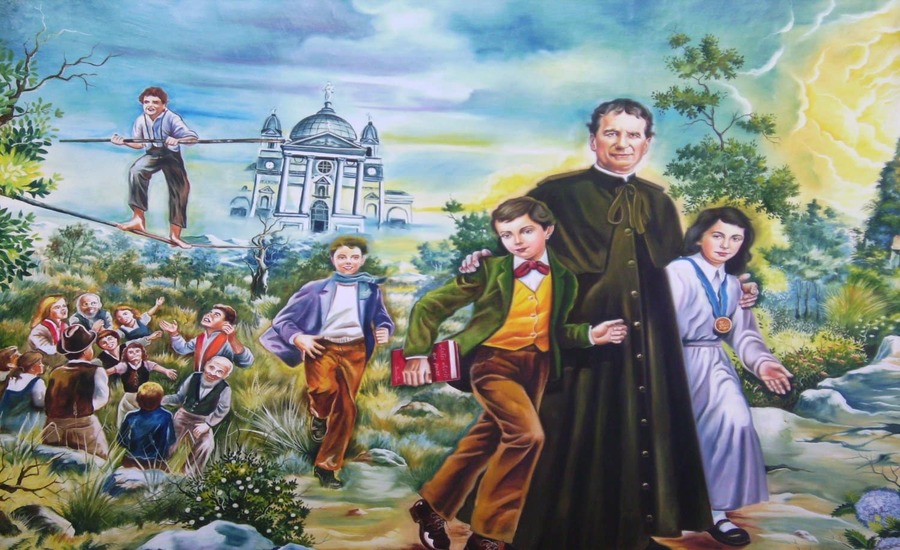Information
St. John Bosco and Davico: A Timeless Bond of Faith and Service to Humanity

In the course of history, certain individuals have left an indelible mark not only on their immediate communities but on the world at large. Among them, St. John Bosco, the Italian priest, educator, and founder of the Salesian order, stands as one of the most influential figures in the realm of Catholicism and humanitarian service. His legacy, rooted in his unwavering faith, commitment to youth, and innovative educational methods, has transcended generations. However, another figure, Davico, is often brought into conversations about the long-standing legacy of service, charitable works, and the spirit of sacrifice for others. While not as widely known as St. John Bosco, the figure of Davico provides a poignant example of the timeless bond between faith, service, and the impact that such figures can have on humanity.
This article delves into the life and works of St. John Bosco and explores the life of Davico in parallel, shedding light on how their respective contributions embody a bond that goes beyond time and geographical boundaries. Through their dedication, compassion, and commitment to the betterment of society, these two individuals represent a living testament to how faith can inspire monumental change, from the most humble communities to the global stage.
The Early Life and Spiritual Journey of St. John Bosco
Born on August 16, 1815, in the small village of Castelnuovo d’Asti in Northern Italy, St. John Bosco’s life was shaped by both the simplicity of his early circumstances and his deep spiritual calling. He was the son of Francesco Bosco and Margaret Occhiena, who raised him with a strong sense of Christian values. His father died when John was just two years old, leaving his mother to raise him and his brothers with a commitment to faith and perseverance.
From a young age, John Bosco exhibited an innate sense of compassion and a desire to help others, particularly the poor and disenfranchised. Despite the hardships of his early life, including financial struggles and the challenge of balancing his studies with the need to work, he felt a divine call to the priesthood. His early education was marked by an intense desire to learn, and he demonstrated remarkable intelligence and resourcefulness. His mother, Margaret, played a pivotal role in fostering his faith, guiding him to develop a profound connection with God even in the most difficult times.
Bosco’s journey into the priesthood was not without obstacles. At the seminary, he struggled with both financial limitations and the lack of resources. However, his deep conviction and determination led him to pursue his theological studies despite these challenges. His education was not just academic; it was also rooted in spirituality, prayer, and the desire to serve God and others.
The Founding of the Salesian Congregation
After his ordination as a priest in 1841, St. John Bosco began working with poor and abandoned boys in the streets of Turin. His ministry initially focused on providing education and vocational training to children who had no other means of support. The challenges of urban poverty were rampant in Italy during the industrial revolution, and many young boys were left without guidance or hope.
Bosco’s approach to education was revolutionary for its time. Instead of harsh discipline and punishment, he emphasized love, reason, and religion as the core principles for teaching and guiding young people. His “Preventive System,” as it came to be known, focused on fostering a sense of dignity, respect, and moral responsibility in the youth, emphasizing the importance of building a relationship of trust and affection between teacher and student. His focus on preventative measures, rather than punitive ones, helped reduce the likelihood of crime and misconduct among the boys in his care.
In 1859, St. John Bosco founded the Salesian Society, named after St. Francis de Sales, to continue and expand his work with the youth. This religious order was built on the foundation of education, social outreach, and the care of the young, especially those most in need. Through his commitment to the Salesians, Bosco was able to establish schools, orphanages, and technical institutes throughout Italy, and his influence soon spread beyond the borders of his homeland.
The Salesian order grew rapidly, attracting both religious and lay members who were drawn to Bosco’s mission. His charismatic leadership, coupled with his profound faith and innovative approach to education, helped him build a global network of institutions that continued to serve underprivileged youth long after his death.
The Role of Davico: A Parallel of Service
While St. John Bosco’s influence has been well-documented and his contributions continue to shape Catholic education and youth work, the figure of Davico presents an intriguing, lesser-known parallel in the realm of faith-driven humanitarian service. Although Davico may not have had the same widespread recognition as St. John Bosco, his life, service, and works provide a profound example of how one individual, guided by a similar sense of faith and compassion, can create lasting change in their community.
Davico’s life was defined by his commitment to serving others, particularly the marginalized and the downtrodden. Raised in a small rural town, he too experienced the hardships of poverty, but from an early age, he exhibited a strong desire to serve God and his fellow man. His faith was central to his identity, and he was inspired by the example of figures like St. John Bosco, who were committed to serving the poor and offering education as a pathway out of poverty.
Throughout his life, Davico worked tirelessly in various charitable endeavors, focusing primarily on providing education, healthcare, and social support for those who had little access to such resources. He was known for his humility, compassion, and dedication to the values of Christian charity. Like Bosco, Davico believed in the transformative power of love and kindness, using his faith as the driving force behind his actions.
Davico’s work, though not as well-documented in the annals of history, was instrumental in improving the lives of countless individuals in his community. Through his efforts, many children who would otherwise have been neglected or abandoned were given the opportunity to receive an education. His legacy, though quieter than that of St. John Bosco, remains a powerful testament to the impact that faith-driven service can have on the world.

Faith as the Foundation of Service
The bond between St. John Bosco and Davico can be understood through their shared commitment to faith as the foundation of their service to humanity. Both men were driven by an unwavering belief that serving others, particularly the poor and the youth, was not just a charitable act but a sacred duty. Their faith was not passive; it was active, compelling them to take tangible steps to improve the lives of others.
Faith was the lens through which they viewed the world. For both Bosco and Davico, helping the most vulnerable was an expression of divine love, and it was this love that shaped every aspect of their work. Whether it was Bosco’s founding of schools and technical institutes or Davico’s work in healthcare and education, both men saw their actions as part of a larger spiritual mission.
In a world often marked by division, inequality, and strife, both St. John Bosco and Davico exemplified how faith can be a unifying force. Their lives show us that faith, when put into action, is not merely about personal salvation but about bringing about real, lasting change in the lives of others. Their service was not about recognition or accolades; it was about transforming lives and communities through love, compassion, and a dedication to the greater good.
The Legacy of St. John Bosco and Davico
The lasting legacy of St. John Bosco and Davico is evident in the institutions, charitable works, and individuals they inspired. The Salesian order, which Bosco founded, continues to thrive today, with Salesian schools, orphanages, and missionary works spread across the globe. The impact of his “Preventive System” in education has been adopted in numerous educational institutions worldwide, and his influence can still be felt in the countless young lives that have been touched by his work.
Similarly, Davico’s legacy lives on in the communities he served, the individuals he mentored, and the institutions he helped establish. His life and work, though perhaps not as widely recognized as St. John Bosco’s, reflect the same core values of faith, service, and selflessness that continue to inspire generations of people committed to social justice and humanitarian efforts.
Conclusion
The bond between St. John Bosco and Davico is a timeless one, rooted in their shared commitment to faith and service to humanity. Their lives stand as a testament to the transformative power of love, compassion, and dedication to the welfare of others. In a world that continues to face challenges, the examples set by these two men remind us of the profound impact that one individual, guided by faith and a desire to serve, can have on the world. Their legacy lives on, not only in the institutions they built but in the countless lives they touched through their unwavering commitment to the values of faith, education, and service to others.
FAQs:
-
Who was St. John Bosco?
St. John Bosco, also known as Don Bosco, was an Italian priest, educator, and founder of the Salesian Society. He is renowned for his work with poor and abandoned youth, particularly in the urban centers of Italy. His educational philosophy, known as the “Preventive System,” emphasized love, reason, and religion as the core principles for guiding and educating young people. Bosco’s legacy includes the establishment of schools, orphanages, and technical institutes dedicated to youth education, as well as the global expansion of the Salesian order.
-
What was St. John Bosco’s main educational philosophy?
St. John Bosco’s educational philosophy, known as the “Preventive System,” focused on fostering a sense of dignity, respect, and moral responsibility in the youth. Instead of using punishment and discipline as primary tools, Bosco advocated for building relationships of trust, affection, and understanding between teachers and students. The system was designed to prevent bad behavior through love, guidance, and an emphasis on religion.
-
Who was Davico, and what role did he play in humanitarian service?
Davico was a lesser-known figure who, like St. John Bosco, devoted his life to serving the poor and underprivileged. Though not widely recognized in historical records, Davico’s contributions to education, healthcare, and community development were significant in his local area. He was deeply influenced by faith and believed in the transformative power of service, particularly for the marginalized and vulnerable populations in his community.
-
What was the core bond between St. John Bosco and Davico?
The bond between St. John Bosco and Davico lies in their shared commitment to faith and humanitarian service. Both men, guided by their Christian beliefs, dedicated their lives to improving the lives of others, especially youth and the poor. They exemplified how faith can be a powerful motivator for social change and how service to others can transcend time, location, and social status.
-
How did St. John Bosco’s work impact global education?
St. John Bosco’s contributions to education were far-reaching, particularly through the establishment of the Salesian order, which grew into a global network of schools, orphanages, and educational centers. His “Preventive System” has been adopted by educational institutions around the world, focusing on the moral and emotional development of young people in addition to their academic growth. Today, Salesian institutions continue to serve underprivileged youth in over 130 countries, providing education, vocational training, and social services.
-
What was Davico’s approach to helping the poor?
Davico’s approach was grounded in a deep sense of faith and Christian charity. Like St. John Bosco, he believed that education was a key to breaking the cycle of poverty. In his community, he focused on providing educational opportunities, healthcare, and social support to those in need. Through his work, many children who would have otherwise been neglected received schooling and the chance to improve their lives. His emphasis on personal care, humility, and dedication to service mirrored the ideals of St. John Bosco.
-

 Fashion9 months ago
Fashion9 months agoLiteroticaTags Explained: Find And Use The Top Tags For 2025
-

 BUSINESS10 months ago
BUSINESS10 months agoWhat is NippyDrive? A Complete Guide to Using NippyDrive
-

 Biography9 months ago
Biography9 months agoCoco Lovelock Bio, Age, Career, Net Worth, Height, Education, Boyfriend & More
-

 Biography9 months ago
Biography9 months agoWho Is Meow Miu? Get to Know the Latest Star in the Spotlight
-

 Fashion9 months ago
Fashion9 months agoWebfreen.com Fashion: Redefining Affordable Luxury
-

 Home Improvement9 months ago
Home Improvement9 months agoValvula Check 32mm Sodimac: Comprehensive Guide
-

 BUSINESS7 months ago
BUSINESS7 months ago9 Packaging Trends You Can’t Afford to Ignore in 2025
-

 TECHNOLOGY7 months ago
TECHNOLOGY7 months agoTransform Text into Stunning Videos: Free Online AI Text-to-Video Generator
